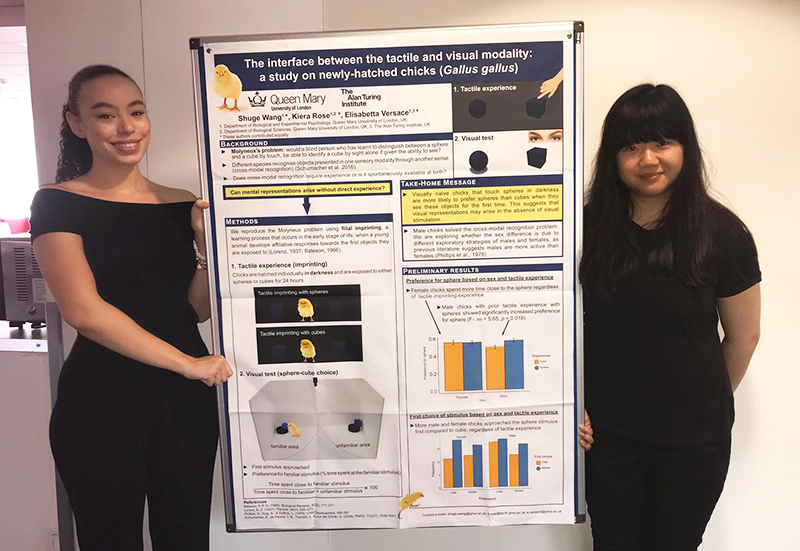SBCS student project awarded Cognition and Evolution poster award
A project by MSc Ecology and Evolutionary Biology student Kiera Rose and PhD student Shuge Wang from Queen Mary University of London’s School of Biological and Chemical Sciences (SBCS) recently won a poster award at the renowned international workshop CogEvo 2019, co-organised by University of Trento and Harvard University.

Kiera Rose and Shuge Wang with their winning poster.
As part of the award, Kiera and Shuge were invited to CogEvo 2019, where their poster was presented. The workshop took place from 10-12 July and included a number of talks and poster sessions, with a focus on young researchers. The topics of the talks included animal consciousness, cognition in free-range chickens, human infants and the mind of the bee, which was presented by SBCS Professor of Sensory and Behavioural Ecology Lars Chittka.
Research
The research, conducted under the supervision of SBCS Lecturer in Psychology Dr Elisabetta Versace, investigates whether chicks could be imprinted within the tactile modality (in darkness) and recognise objects in visual modality. In the first stage of the experiment, chicks would be able to interact with an object in complete darkness – either a cube or a sphere – to see if they could imprint on that object purely by touching the object rather than seeing it. The next stage involved a double choice test in the visual modality to see if they could recognise the object they had imprinted on. The results would help determine if tactile imprinting is possible and if the chicks could recognise the objects, despite having no previous visual experience.
The study stemmed from philosopher William Molyneux’s thought experiment concerning immediate recovery from blindness. If a blind person who had learnt to distinguish between objects through touch had their sight restored, would they be able to distinguish between objects through sight alone?
Future Research
After critically discussing the project, Kiera and Shuge believe that future studies could involve more complex objects, perhaps removing the sphere as one of the choices due to its possible predisposition among the chicks. Another study could involve testing from the visual to the tactile modality to see if chicks can visually imprint on an object and then show a preference for that object in darkness. It is hoped that further experiments could finally answer Molyneux’s centuries-old question.
More information
- Study Ecology and Evolutionary Biology at Queen Mary
- Learn more about our research in psychology and biology